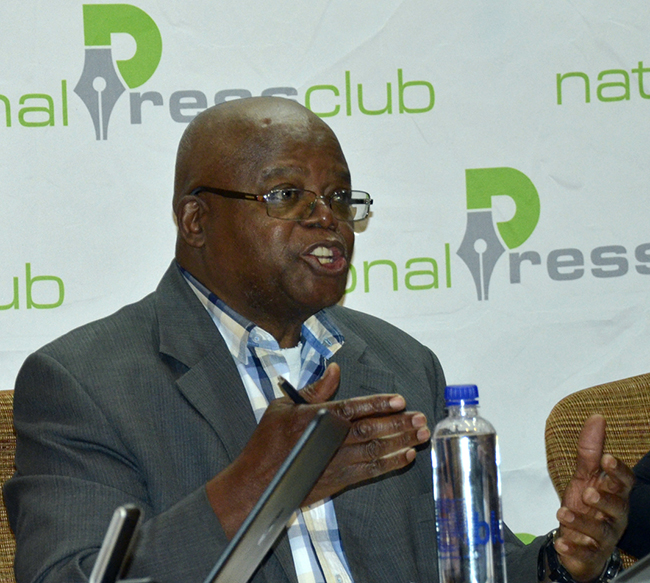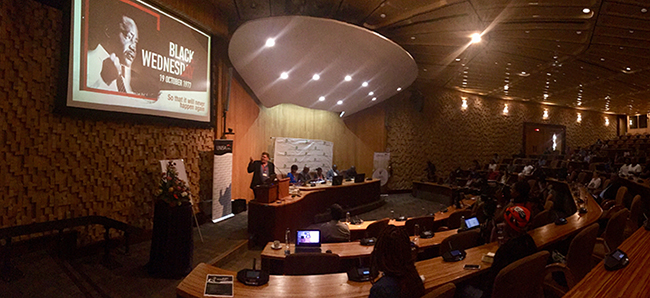News & Events
‘Journalists must decode’ – Percy Qoboza remembered
Speaking at the 8th annual Percy Qoboza Memorial Lecture, Father Smangaliso Makhatswa said that Qoboza used the media platform to decode the events of the day to his readers, and that this remains a key responsibility of today’s media practitioners. Organised by the National Press Club and Unisa, the lecture took place on 19 October in celebration of media freedom in South Africa.
On 19 October 1977, the apartheid regime declared illegal 19 Black Consciousness organisations, banned two newspapers, and detained scores of activists. The World newspaper editor Percy Qoboza and other journalists were subsequently arrested and jailed. This day is now commemorated in South Africa as Black Wednesday and is also marked as National Press Freedom Day.
A day of celebration
Delivering the keynote address, Father Smangaliso Makhatswa, a Catholic priest who himself was persecuted by the apartheid regime, said that the responsibility of the media is to embark on the transformation of the country for the good of all. ‘19 October has become a day of celebration,’ he said, ‘following the dawn of democracy 20 years ago. It is therefore no longer a black Wednesday, but rather a joyous Wednesday.’

Keynote speaker Father Smangaliso Makhatswa, a Catholic priest who was persecuted by the South African apartheid state. He later became a member of the first post-apartheid parliament (1994) and then mayor of the City of Tshwane Metropolitan Municipality.
Makhatswa said that Qoboza and his peers not only fought for freedom in the narrow sense of the word, but also confronted the apartheid injustices in its various manifestations. ‘This was because at that time it was the biggest challenge that faced all of us,’ he said. ‘The free media used journalism to fight not individuals but rather the system, because that is where the problem lay. Returning to the present day, we need to ask what they would do were they alive today. Apartheid has been dismantled, so they would no longer be in that struggle. They would certainly identify the ills of the day and use their journalism skills to confront them. They would be fighting state capture, corruption, and crime against women and children.’
An RDP of the soul needed
‘Media practitioners, Percy and his contemporaries are not here today, but you are,’ continued Makhatswa. ‘These challenges are now yours. In my view, the biggest problem facing us today emanates from one metaphysical cause, which is moral decay; a serious crisis of morality. To borrow from Nelson Mandela, we need an RDP of the soul. His sentiments were echoed last week by President Cyril Ramaphosa when he delivered the Desmond and Leah Tutu International Peace Lecture. His passionate plea was for urgent social and moral regeneration.’
Makhatswa said that during the past three years or so the media covered itself in glory by relentlessly exposing and reporting on the many evils facing the country. ‘Of course, the recent events at the Sunday Times reminded remind us that press freedom can also be turned on its head and used for nefarious purposes,’ he cautioned. ‘The media needs to be more vigilant about their own responsibility. Appalling though it may be, what has been reported to have taken place at that publication cannot justify throwing out the baby with the bath water. We must not rush to conclusions and seek to muzzle the media. A free media is the oxygen that democracy needs in order to survive and to do its work.
Intricacies must be decoded by journalists
Makhatswa concluded by saying that over the years the South African media has faced criticism that it is not patriotic, and of late some political leaders have expressed their scepticism of the role of the media, labelling its reporting as one-sided. ‘I can truly say we’ve done some things very well in past years, and some things need to be corrected. Media practitioners, your task should include tackling also the other problems of our day, as Percy did. Racism has become more subtle and since wealth is no longer the exclusive privilege of whites, the issue of class has become very important. Journalists must decode for their readers what is happening in society.
The lecture was followed by a panel discussion with National Press Club executive committee member and Pretoria News news editor, Ntando Makhubu, President of the Public Relations Institute of Southern Africa, Malesela Maubane, and political analyst, Mpumelelo Mkhabela.
The National Press Club also awarded the annual Patrick Hlahla Bursary to Vusi Mbhele, a deserving Unisa Communications Science student. The late Patrick Hlahla was a respected member of the media, working at the Pretoria News, and a former chairperson of the National Press Club.
* By Philip van der Merwe
About the Percy Qoboza Memorial Lecture
The National Press Club and UNISA organised the first Percy Qoboza Memorial Lecture in 2011. It was delivered by Professor Kobus van Rooyen. In 2012, Jay Naidoo delivered the lecture followed by Joe Thloloe in 2013. The lecture was delivered by Mondli Makhanya in 2014, Moshoeshoe Monare in 2015 and Kevin Ritchie in 2016. Last year, Qoboza’s son Vusi delivered the lecture.
Source: National Press Club - https://www.nationalpressclub.co.za
Publish date: 2018/10/24

